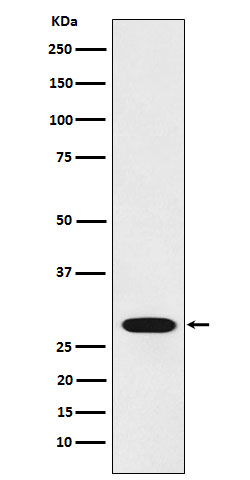Anti-RCHY1 Rabbit Monoclonal Antibody
- SPECIFICATION
- CITATIONS
- PROTOCOLS
- BACKGROUND

Application
| WB, IF, ICC, IP |
|---|---|
| Primary Accession | Q96PM5 |
| Host | Rabbit |
| Isotype | IgG |
| Reactivity | Human, Mouse |
| Clonality | Monoclonal |
| Format | Liquid |
| Description | Anti-RCHY1 Rabbit Monoclonal Antibody . Tested in WB, ICC/IF, IP applications. This antibody reacts with Human, Mouse. |
| Gene ID | 25898 |
|---|---|
| Other Names | RING finger and CHY zinc finger domain-containing protein 1, 2.3.2.27, Androgen receptor N-terminal-interacting protein, CH-rich-interacting match with PLAG1, E3 ubiquitin-protein ligase Pirh2, RING finger protein 199, RING-type E3 ubiquitin transferase RCHY1, Zinc finger protein 363, p53-induced RING-H2 protein, hPirh2, RCHY1 |
| Calculated MW | 30 kDa |
| Application Details | WB 1:500-1:2000 ICC/IF 1:50-1:200 IP 1:50 |
| Contents | Rabbit IgG in phosphate buffered saline, pH 7.4, 150mM NaCl, 0.02% sodium azide and 50% glycerol, 0.4-0.5mg/ml BSA. |
| Clone Names | Clone: 26R35 |
| Immunogen | A synthesized peptide derived from human RCHY1 |
| Purification | Affinity-chromatography |
| Storage | Store at -20°C for one year. For short term storage and frequent use, store at 4°C for up to one month. Avoid repeated freeze-thaw cycles. |
| Name | RCHY1 |
|---|---|
| Function | E3 ubiquitin-protein ligase that mediates ubiquitination of target proteins, including p53/TP53, TP73, HDAC1 and CDKN1B (PubMed:16914734, PubMed:17721809, PubMed:18006823, PubMed:19043414, PubMed:19483087, PubMed:21994467). Mediates ubiquitination and degradation of p53/TP53; preferentially acts on tetrameric p53/TP53 (PubMed:19043414, PubMed:19483087). Catalyzes monoubiquitinates the translesion DNA polymerase POLH (PubMed:21791603). Involved in the ribosome-associated quality control (RQC) pathway, which mediates the extraction of incompletely synthesized nascent chains from stalled ribosomes: RCHY1 acts downstream of NEMF and recognizes CAT tails associated with stalled nascent chains, leading to their ubiquitination and degradation (PubMed:33909987). |
| Cellular Location | Nucleus. Nucleus speckle. Cytoplasm |

Thousands of laboratories across the world have published research that depended on the performance of antibodies from Abcepta to advance their research. Check out links to articles that cite our products in major peer-reviewed journals, organized by research category.
info@abcepta.com, and receive a free "I Love Antibodies" mug.
Provided below are standard protocols that you may find useful for product applications.
If you have used an Abcepta product and would like to share how it has performed, please click on the "Submit Review" button and provide the requested information. Our staff will examine and post your review and contact you if needed.
If you have any additional inquiries please email technical services at tech@abcepta.com.













 Foundational characteristics of cancer include proliferation, angiogenesis, migration, evasion of apoptosis, and cellular immortality. Find key markers for these cellular processes and antibodies to detect them.
Foundational characteristics of cancer include proliferation, angiogenesis, migration, evasion of apoptosis, and cellular immortality. Find key markers for these cellular processes and antibodies to detect them. The SUMOplot™ Analysis Program predicts and scores sumoylation sites in your protein. SUMOylation is a post-translational modification involved in various cellular processes, such as nuclear-cytosolic transport, transcriptional regulation, apoptosis, protein stability, response to stress, and progression through the cell cycle.
The SUMOplot™ Analysis Program predicts and scores sumoylation sites in your protein. SUMOylation is a post-translational modification involved in various cellular processes, such as nuclear-cytosolic transport, transcriptional regulation, apoptosis, protein stability, response to stress, and progression through the cell cycle. The Autophagy Receptor Motif Plotter predicts and scores autophagy receptor binding sites in your protein. Identifying proteins connected to this pathway is critical to understanding the role of autophagy in physiological as well as pathological processes such as development, differentiation, neurodegenerative diseases, stress, infection, and cancer.
The Autophagy Receptor Motif Plotter predicts and scores autophagy receptor binding sites in your protein. Identifying proteins connected to this pathway is critical to understanding the role of autophagy in physiological as well as pathological processes such as development, differentiation, neurodegenerative diseases, stress, infection, and cancer.



